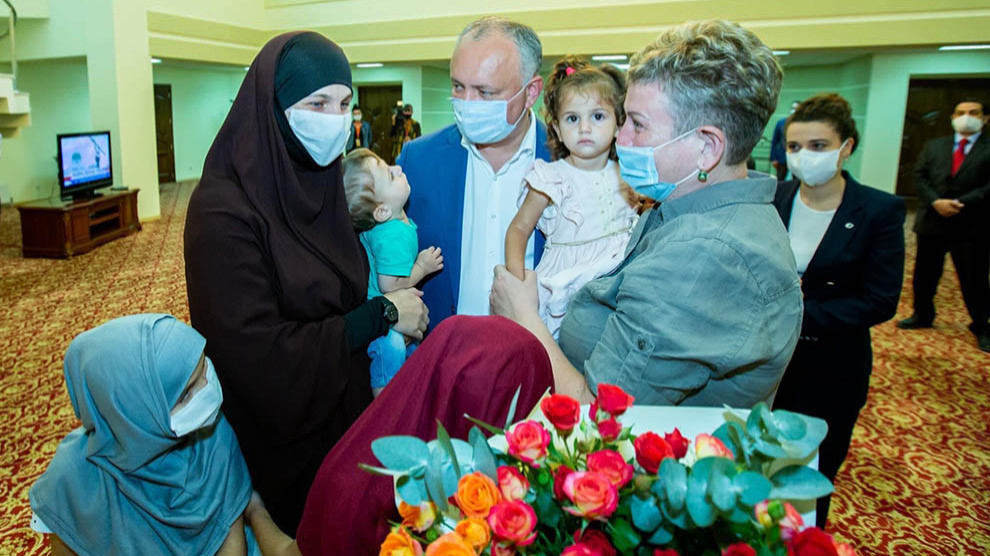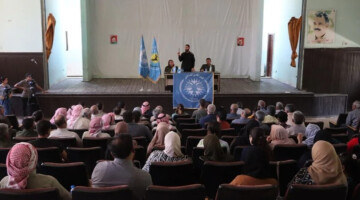The Turkish secret service MIT has freed a Moldovan female member of ISIS and her children held in the Hol (al-Hawl) camp in Hesekê in northeast Syria and handed them over to Moldova. The "rescue operation", according to a report by the official news agency AA, apparently took place at the request of the government of the South-East European country. Meanwhile, it is unclear why Moldova turned to NATO partner Turkey to free a member of the terrorist organization ISIS from coalition custody instead of lobbying the Autonomous Administration of North and East Syria for the repatriation of the woman and her four children.
The AA report states with arrogant rhetoric that the MIT has told Moldovan Natalia Barkal "using technical possibilities and unique methods of artificial intelligence" how she could leave the camp. On June 6, she was finally "liberated from the hands of YPG/PKK" and first taken to the Turkish occupation zone Girê Spî (Tal Abyad). Yesterday, Thursday, Barkal and her four children aged between one and ten years were received at Chisinau airport by Moldovan President Igor Dodon. The pro-Russian politician then twittered that the "successful operation to repatriate a Moldovan family from Syria" was on his initiative.
According to the camp administration in Hol, jihadist Natalia Barkal was captured by the Syrian Democratic Forces (SDF) last spring after the fall of the last ISIS bastion in Baghouz in eastern Syria. In Hol she was accommodated in the " Muhajarad" (Emigrant) area for the families of the foreign jihadists. She is considered a leading member of the "Hisba structure" responsible for the reorganization of the ISIS. In Islam, the Hisba is a religious institution for the preservation of the Sharia order. The predominantly foreign Hisba women in Hol therefore call themselves "Sharia Guardians" and have set up a secret court in which women and men from the camp are convicted for "misconduct". With a "religious police" they also try to maintain their tyrannical rule. At least 30 murders of ISIS apostates from the camp in the last twelve months are attributable to the Hisba.
The version of AA on Barkal's background sounds completely different; “Until 2013, the woman lived with her Syrian husband in Moldova's capital Chisinau. Then they decided to emigrate to Syria to "trade" in Manbij. In 2017 her then husband is said to have been killed in clashes. She herself ended up in "YPG/PKK detention".”
How Barkal's life was in Baghouz until her arrest two years later is not discussed by the official press agency of Turkey.
A source from Hol Camp, who does not want to mentioned with name for security reasons, told ANF correspondent Ersin Çaksu that Natalia Barkal could possibly be an important contact person for the Turkish government. "Why else has such an effort been made to evacuate her from the camp on such a scale?" the source said.
Hol Camp
The Hol Camp consists of eight areas. In areas one, two and three are people from Mosul who fled from the ISIS in 2014. Area four houses Syrian internally displaced persons. In areas five, six and seven, ISIS jihadists and their relatives are detained and the families of the foreign jihadists are held in the area "Muhajarad" (Emigrants).
Currently, Hol is home to about 65,000 people. The tent city was built by the UNHCR for Iraqi refugees at the beginning of 1991 during the Second Gulf War. After it was closed in the meantime, the camp was reopened during the Iraq war in 2003. Since the dismantling of the ISIS’ territorial rule in spring 2019, it is mainly used to house women and children who previously lived in areas under ISIS control.
RELATED NEWS:













